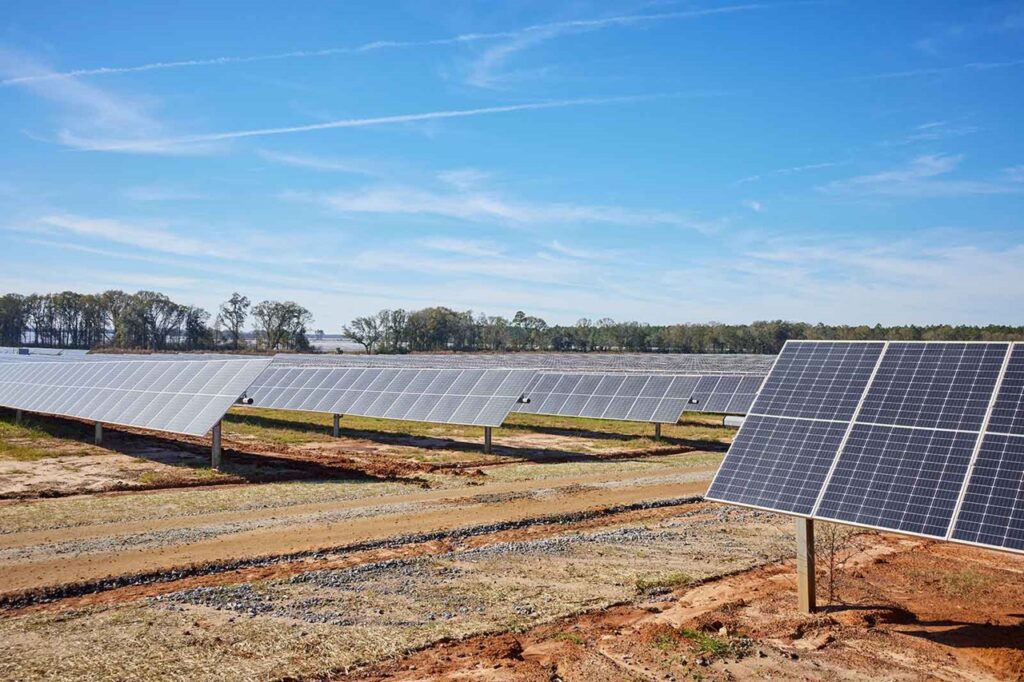
RWE’s Hickory Park project, which is one of the first DC-coupled large-scale solar-plus-storage projects in the US and from which Georgia Power will buy energy for 30 years. Image: RWE.
US utility Georgia Power has filed an update to its integrated resource plan (IRP) through which the company would procure an additional 4GW of renewables and up to 1GW of battery storage resources.
IRPs are the long-term planning tools of regulated utility companies in the US, which are filed with state regulators for approval and set out pathways for resource procurement and management of electricity networks.
As the energy transition away from fossil fuels gathers pace, IRPs are playing an increasingly important role in mapping out how the US will get there.
Georgia Power filed its most recent IRP in 2022, but said in late October as the update was published that “extraordinary economic growth” in the US state – which is becoming home to numerous new industrial developments including electric vehicle (EV) battery factories – means it is having to revise its projections.
Approved by the Georgia Public Service Commission (PSC) in July last year, the 2022 IRP included estimates that the utility would require close to an additional 4,000MW of energy capacity by 2031 to keep pace with changing energy demand.
By 2035, the utility wanted to procure 6,000MW of renewable energy capacity. However, the company said on 27 October that the growth in demand by 2030 would instead be almost double what it had previously forecast, at 6,600MW by 2030.
In turn, Georgia Power said it anticipated a need to instead add approximately 10,000MW of renewable energy capacity by 2035, and expand its fleet of battery energy storage system (BESS), including renewables-plus-storage hybrid plants and distributed energy resources (DER).
“Georgia has continued to experience rapid economic growth since the filing of our IRP in early 2022. Many businesses coming to the state are bringing large electrical demands at both a record scale and velocity,” Georgia Power CEO, chairman and president Kim Greene said.
In addition to the low carbon resources, the utility, a subsidiary of utility holding group Southern Company is also seeking approval for other capacity, including the right to develop, own and operate three simple cycle combustion turbine (CT) gas power plants totalling 1,400MW at its Plant Yates power station complex.
It will also look to build out its transmission infrastructure to integrate the growth in capacity.
Request to own and operate 1,000MW of BESS
As far as BESS is concerned, the updated plan asks for approval to develop, own and operate up to 1,000MW of the technology at various sites, including retrofits at existing solar PV plants and integration with new PV plants.
That builds on a request to procure 500MW of energy storage systems included in the 2022 IRP, as well as a request to develop its own 265MW McGrau Ford BESS facility.
The company issued a request for information (RFI) in late September for prospective providers of capacity resources of between 100MW and 1,200MW each to come forward, with technologies including standalone BESS, renewables-plus-storage and thermal power plants eligible.
The company has taken a big leap into energy storage after its 2019 IRP – the last one before 2022 – was the first to include storage. In that IRP, Georgia Power requested, and got, permission to build, own and operate 80MW of BESS.
Related developments for the company include the coming online in mid-2022 of European energy company RWE’s largest solar-plus-storage project in the US, Hickory Park, which pairs 195.5MW of solar PV with 40MW/80MWh of BESS, and from which Georgia Power will buy energy through a 30-year power purchase agreement (PPA).
Georgia Power is also one of three US utilities so far to have agreed to pilot the deployment of a novel iron-air battery storage technology developed by startup Form Energy. The battery, which works by rusting and de-rusting iron as it charges and discharges, is intended to offer up to and around 100-hour duration of storage.